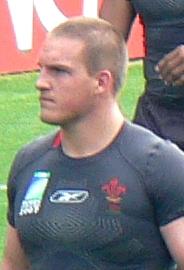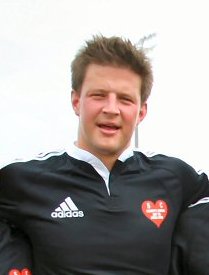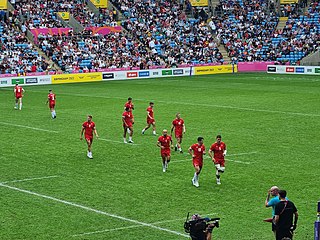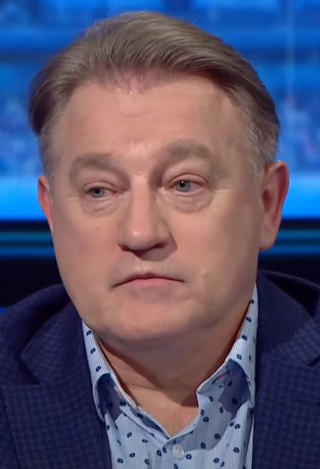Related Research Articles

Rugby sevens is a variant of rugby union in which teams are made up of seven players playing seven-minute halves, instead of the usual 15 players playing 40-minute halves. Rugby sevens is administered by World Rugby, the body responsible for rugby union worldwide. The game is popular at all levels, with amateur and club tournaments generally held in the summer months. Sevens is one of the most well distributed forms of rugby, and is popular in parts of Africa, Asia, Europe, and the Americas, and especially in the South Pacific.
Joel Theodore Stransky is a South African former rugby union player. A fly-half, he is known for scoring all of South Africa's points, including the winning drop goal, against New Zealand in the 1995 Rugby World Cup final.

Philip John Vickery MBE DL is a former English rugby union tighthead prop and member of the England squad. He was a member of England's World Cup winning squad in 2003, playing in all seven matches in the tournament, and is a former England captain. Vickery ended his club rugby career at London Wasps, joining the London side in 2006 after eleven years with Gloucester Rugby. Given the nickname "Raging Bull", he played in three Rugby World Cups, including as England captain in the 2007 tournament, and toured Australia and South Africa with the British & Irish Lions. Made his debut for Bolingey Barbarians Sunday 25th Sept 2022 vs Bude vets.

Dragons RFC are one of the four professional rugby union regional teams in Wales. They are owned by the Welsh Rugby Union and play their home games at Rodney Parade, Newport. They play in the United Rugby Championship and the European Rugby Champions Cup/European Rugby Challenge Cup. The region they represent covers an area of southeast Wales including Blaenau Gwent, Caerphilly, Monmouthshire, Newport and Torfaen with a total population approaching 600,000 and they are affiliated with a number of semi-professional and amateur clubs throughout the area, including Pontypool RFC, Caerphilly RFC, Cross Keys RFC, Ebbw Vale RFC and Newport RFC.

The Samoa national rugby union team represents the Samoa Rugby Union in men's international rugby union. They are also known as "Manu Samoa", which is thought to derive from the name of a Samoan warrior. They perform a traditional Samoan challenge called the siva tau before each game. Samoa Rugby Union were formerly members of the Pacific Islands Rugby Alliance (PIRA) along with Fiji and Tonga. They are ranked 11th in the world.

The Ethiopia national football team, nicknamed Walia, after the Walia ibex, represents Ethiopia in men's international football and is controlled by the Ethiopian Football Federation, the governing body for football in Ethiopia. The team has been representing Ethiopia in regional, continental, and international competitions since its founding in 1943. The Walias play their home games at Addis Ababa Stadium located in the capital city of Addis Ababa. They are currently ranked 150th in the world according to the FIFA World Rankings and 44th in CAF.

The 1962 African Cup of Nations was the third edition of the Africa Cup of Nations, the football championship of Africa (CAF). It was hosted by Ethiopia. Nine countries entered the competition, including the reigning champions Egypt, meaning for the first time a qualification tournament was required. The finals only included four teams. Egypt, as holders, and Ethiopia as hosts, qualified automatically meaning each needed to play only one game to reach the final. Ethiopia won the tournament for the first time, defeating UAR 4–2, after extra time in the final.

Gethin Jenkins is a Welsh former professional rugby union player who played as a prop for Pontypridd, Celtic Warriors, Cardiff Blues and Toulon. At international level, he won 129 caps for Wales. On his 105th appearance in 2014, he became Wales' most-capped player, overtaking the record held by Stephen Jones; having earned his final cap in November 2016, his record was surpassed by Alun Wyn Jones in September 2019. He is one of a small group of Welsh players to have won three Grand Slams. He also won five caps for the British & Irish Lions on three tours in 2005, 2009 and 2013. He is the sixth most-capped player in rugby union history and the second most-capped front-row forward.

Robert Brian Skinstad is a former rugby union professional player who has represented the South African national team, the Springboks. He played in the positions of flanker and number eight. Although he is of British descent through his parents, his surname is of Norwegian origin.

The Wales national rugby sevens team is the national rugby sevens team that represents the country of Wales. The team did compete at the annual World Rugby Sevens Series between 2000 and 2022, however merged with England and Scotland to form the Great Britain sevens team from the 2022–23 season onward. The team also competes at the quadrennial Rugby World Cup Sevens and the Commonwealth Games.

Eddie O'Sullivan is an Irish rugby union coach, player and a former Gaelic footballer. He is a former head coach of Buccaneers RFC the United States national rugby union team and of the Ireland national rugby union team. He was head coach of Biarritz Olympique, who play in the second tier of France, until October 2015.

Saint George Sports Club, otherwise known as Kidus Giorgis, is a professional football club based in Addis Ababa, Ethiopia. They play in the top division of Ethiopian football, the Ethiopian Premier League. Founded in 1935, the club was the first in Ethiopia and was established as a symbol of Ethiopian nationalism and resistance against the occupying forces of fascist Italy.

Ethiopian Coffee Sport Club, otherwise known as Ethiopian Bunna, is a professional Ethiopian football club based in Addis Ababa.
The Ethiopian Premier League, known as the BetKing Ethiopian Premier League for sponsorship reasons, is the top tier association football league of Ethiopia run by the Ethiopian Premier League Share Company. Established in 1997, it replaced the former first division. Contested by sixteen clubs, it operates on a system of promotion and relegation with the other secondary and tertiary leagues in Ethiopia. The league has been an annual competition since the 1997–98 season with Saint George emerging as the country's leading club in this era with 15 titles.

Alun Wyn Jones is a Welsh former international rugby union player who played as a lock. He played most of his career for Ospreys and for the Wales national team. He is the world's most-capped rugby union player, with 158 caps for Wales and 13 for the British & Irish Lions, and also holds the records for the most Wales caps and the second most Wales caps as captain. He retired from rugby in 2023.
Defence Force Sport Club is an Ethiopian professional football club based in the city of Addis Ababa. They play in the Betking Ethiopian Premier League, the first division of professional football in Ethiopia. The team, formerly named Army SC and Mechal SC, is the second most decorated club in Ethiopian football history behind Saint George.
Football is the most popular sport in Ethiopia. Although not one of the leading footballing nations in Africa, Ethiopia has produced some outstanding teams at both club and international level as well as some talented individual players.
The 2006 Cecafa Senior Challenge Cup, sometimes called the Al Amoudi Senior Challenge Cup due to being sponsored by Ethiopian millionaire Mohammed Hussein Al Amoudi, was the 30th edition of the international football tournament, which involved teams from Southern and Central Africa. The matches were all played in Addis Ababa from 25 November to 10 December. It was competed between the same teams as the previous tournament, except for Eritrea, who did not enter due to their long-running clash with Ethiopia regarding borders, and Kenya, the five-time champions, were serving a ban which was issued on 18 October 2006, which was then an indefinite from international football by the decree of the Fédération Internationale de Football Association, or FIFA; this after Kenya "regularly violated or ignored" "Fifa's statutes, regulations and decisions". Malawi and Zambia joined the tournament after being invited, and competed as guest teams as they were from the federation Council of Southern Africa Football Associations (COSAFA), whereas the rest of the teams were from the Council for East and Central Africa Football Associations (CECAFA). The reasoning behind their invitation was that it would "boost the competitiveness of this year's tournament". The defending champions, Ethiopia, were knocked out in the quarter-finals after coming second in their group, and Sudan claimed their second title despite being beaten by Zambia, as Zambia were guests.
The Jan Meda International Cross Country is an annual cross country running competition held at the Jan Meda Race Course in Addis Ababa, Ethiopia. Typically held in January or February, the event serves as the national championship for Ethiopia and doubles as the national trials for the World Athletics Cross Country Championships.

Jan Meda Sport Ground or Jan Meda, is a large field in Addis Ababa, Ethiopia. With an area of 25,000 square kilometers, the sport ground hosts Jan Meda International Cross Country as well as social and religious events, most notability, the Timkat celebration held there.
References
- 1 2 3 4 5 6 7 8 Rugby World Cup helps sport take root in Ethiopia, Taipei Times, published Wednesday, 17 Oct 2007, Page 19, retrieved 15 August 2009]
- 1 2 Nyalas RFC retrieved 15 August 2009
- 1 2 3 4 5 "Football crazy Ethiopians embrace the oval ball". Television New Zealand . Reuters. 3 March 2009. Retrieved 6 November 2011.
- ↑ Playing Rough - Rugby